From the Chicago Reader (April 1, 2002). — J.R.
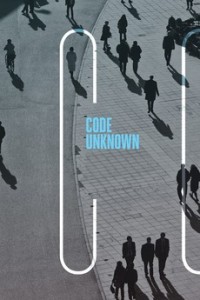
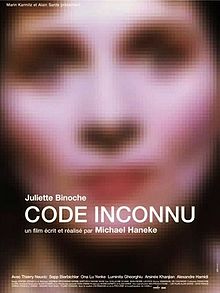
Aptly subtitled Incomplete Tales of Several Journeys, the best feature to date by Austrian director Michael Haneke (2000, 117 min.) is a procession of long virtuoso takes that typically begin and end in the middle of actions or sentences, constituting not only an interactive jigsaw puzzle but a thrilling narrative experiment. The second episode is a nine-minute street scene involving an altercation between an actress (Juliette Binoche), her boyfriend’s younger brother, an African music teacher who works with deaf-mute students, and a woman beggar from Romania; the other episodes effect a kind of narrative dispersal of these characters and some of their relatives across time and space. I couldn’t always get what was happening, but I was never bored, and the questions raised reflect the mysteries of everyday life. The title refers to the pass codes used to enter houses in Paris — a metaphor for codes that might crack certain global and ethical issues. In subtitled French, Malinke, Romanian, German, Arabic, and sign language– and also, occasionally, English. (JR)
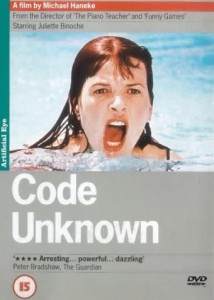 Read more
Read more

A double feature of my two favorite Preston Sturges comedies, both of them sublimely wacko. Christmas in July, his second feature as writer-director (1940, 66 min.), is in many ways his most underrated movie, a riotous satire of capitalism that bites so deep it hurts. An ambitious office clerk (Dick Powell), determined to strike it rich in an advertising contest with his stupid slogan (“If you can’t sleep, it isn’t the coffee, it’s the bunk”), is tricked by a few of his coworkers into believing that he’s actually won, promptly gets promoted, and goes on a shopping spree for his neighbors and relatives. Like all of Sturges’s finest work, this captures the mood of the Depression more succinctly than most pictures, and the brilliantly polyphonic script repeats the hero’s dim-witted slogan so many times that eventually it becomes a kind of crazed tribal incantation. As usual, the supporting cast (including Ellen Drew, William Demarest, and Raymond Walburn) is luminous, and Sturges uses them like instruments in a madcap concerto. In the simultaneously tender and scalding The Palm Beach Story (1942, 88 min.), Rudy Vallee turns in his all-time best performance as a gentle, puny millionaire named Hackensacker. Claudette Colbert, married to a penniless architectural engineer (Joel McCrea), takes off for Florida and winds up being wooed by the millionaire, and when McCrea shows up she persuades him to pose as her brother. Read more
From the July 26, 2002 Chicago Reader. –J.R.
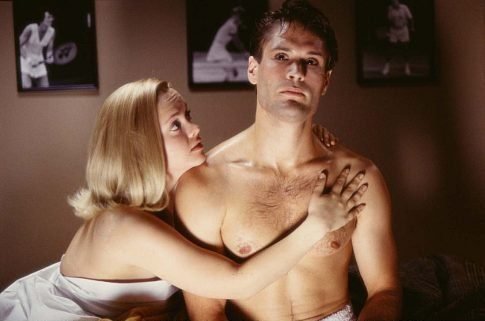
Pumpkin
*** (A must-see)
Directed by Adam Larson Broder and Tony R. Abrams
Written by Broder
With Christina Ricci, Hank Harris, Brenda Blethyn, Dominique Swain, Marisa Coughlan, Sam Ball, Harry Lennix, and Nina Foch.
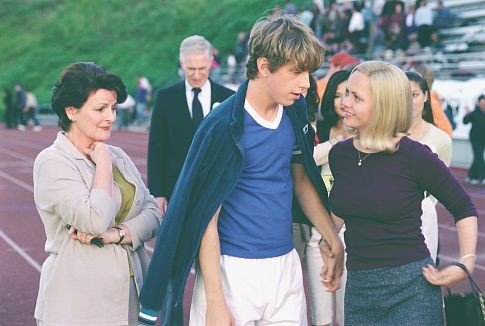
When the New German Cinema started overtaking the French New Wave as a fashionable movement 30 years ago I felt alienated, as if someone had declared a major source of my moviegoing pleasure out-of-bounds. Taking the place of joie de vivre and jazzy invention were cynical disillusionment and cookie-cutter formal patterning — a new kind of style and content that its champions called subversive and its detractors (including me) called defeatist. Whether the mood was sarcastic (Rainer Werner Fassbinder), flamboyant (Werner Herzog), lyrical (Wim Wenders), or hieratic (Werner Schroeter), the overall message seemed to be that people and social conditions were doomed to remain mired in ruts and that hope was for suckers. The 70s were supplanting the 60s, and being glad you were alive was suddenly seen as wimpy and naive.
Little did I realize that this pessimism would remain in the culture while the German films heralding it would be forgotten even faster than the earlier French ones. Read more






